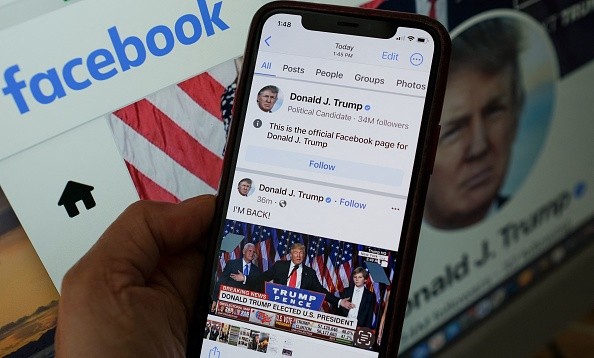A recent Pew survey reveals that most Americans believe social media companies wield excessive political influence.
This sentiment has increased by 6% since the previous presidential election year, indicating bipartisan unease with these platforms' power.

(Photo: CHRIS DELMAS/AFP via Getty Images)
Social Media's Political Influence
Pew Research Center's recent survey reveals that more Americans are worried about how much control social media companies have over politics. People from both sides of politics agree on this, and this concern has grown since the last presidential election.
Results show that 78% of U.S. adults share this concern, with both Republicans (84%) and Democrats (74%) agreeing. One reason for this worry might be the rise of false information, strong opinions, and unfair practices on social media.
As these problems receive more attention, people are becoming more cautious about the power big tech companies have to shape people's opinions about politics.
The survey also shows that many people want stricter rules for social media companies. They want the government to watch them more closely and ensure they're being fair and honest.
Americans' sentiment toward social media mirrors that of their lawmakers. In a rare show of bipartisan cooperation, efforts to regulate social media platforms have gained substantial support.
Senators Marsha Blackburn (R-TN) and Richard Blumenthal (D-CT) are collaborating on the Kids Online Safety Act, which aims to hold social media platforms accountable for protecting children.
In an unlikely partnership, Senators Lindsey Graham (R-SC) and Elizabeth Warren (D-MA) have teamed up to propose legislation for creating a commission to oversee major tech platforms.
At a January Senate hearing, Senator Graham jokingly commented on the collaboration, expressing a sense of irony about working together on such a bill.
Impact of Recent Events
The reasons behind Americans' belief that tech companies wield excessive political power are clear. Since the 2020 survey, social media platforms have been implicated in coordinating the Capitol attack.
Consequently, a sitting president was banned from these platforms for his role in inciting violence. Moreover, concerns about the influence of Chinese-owned TikTok have prompted the government to take action, with President Biden signing a bill that could permanently ban the app.
However, conservative and liberal Americans' opinions regarding tech companies' perceived bias are contrasted.
According to the survey, 71% of Republicans believe that big tech platforms exhibit a bias favoring liberal perspectives over conservative ones. In contrast, 50% of Democrats think these companies treat both views equally.
Overall, only 15% of adults feel that tech companies prefer conservatives over liberals. These findings align with the emergence of explicitly conservative social platforms such as Rumble, Parler, and Trump's Truth Social app.
Throughout President Biden's administration, federal agencies such as the FTC and DOJ have intensified their scrutiny of tech corporations.
Allegations of monopolistic practices have led to significant lawsuits against major players like Amazon, Apple, and Meta.
Related Article: Social Media Users Find It Hard to Identify AI Bots in Political Discussions, New Study Shows


![Apple Watch Series 10 [GPS 42mm]](https://d.techtimes.com/en/full/453899/apple-watch-series-10-gps-42mm.jpg?w=184&h=103&f=9fb3c2ea2db928c663d1d2eadbcb3e52)


